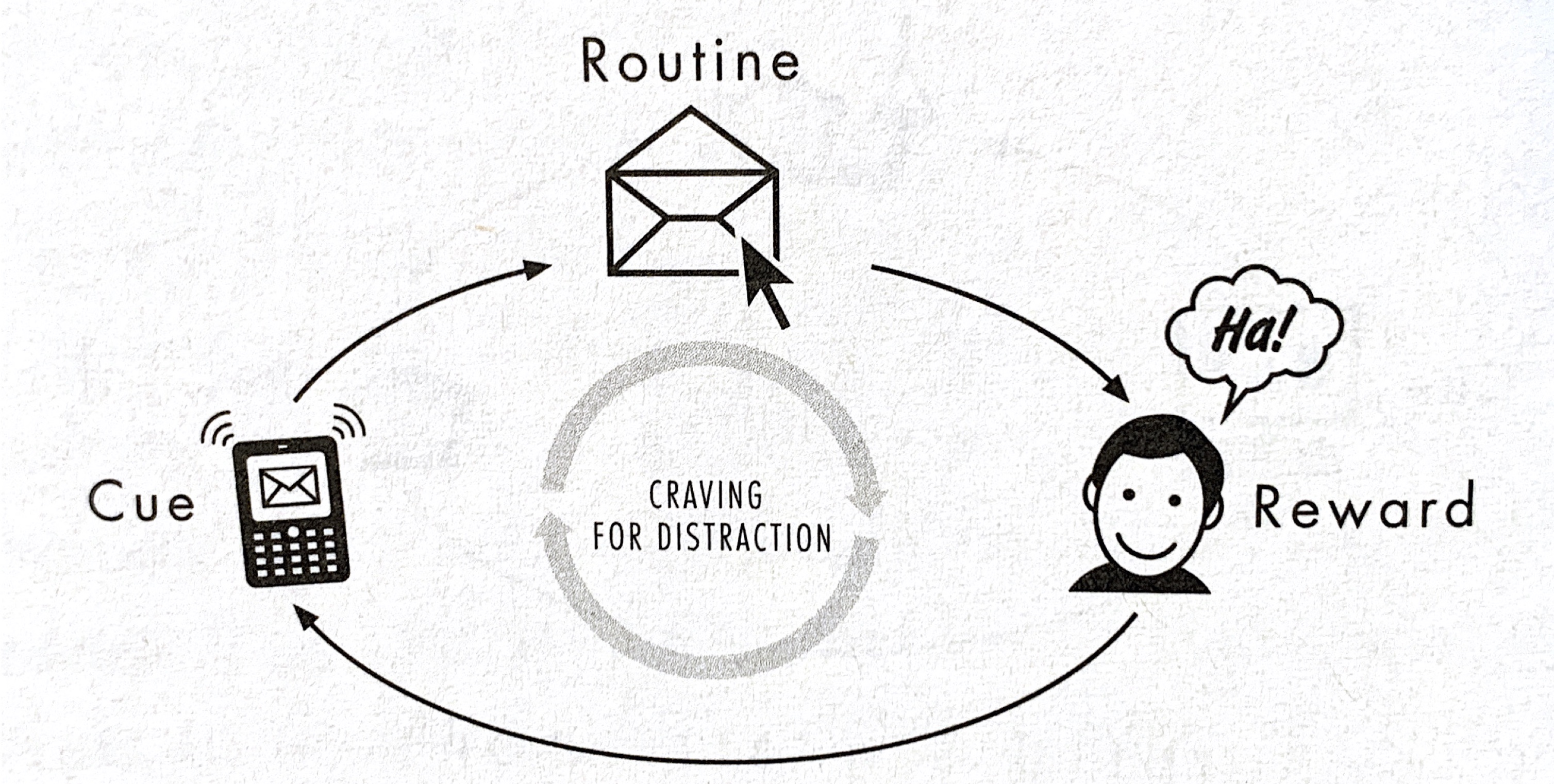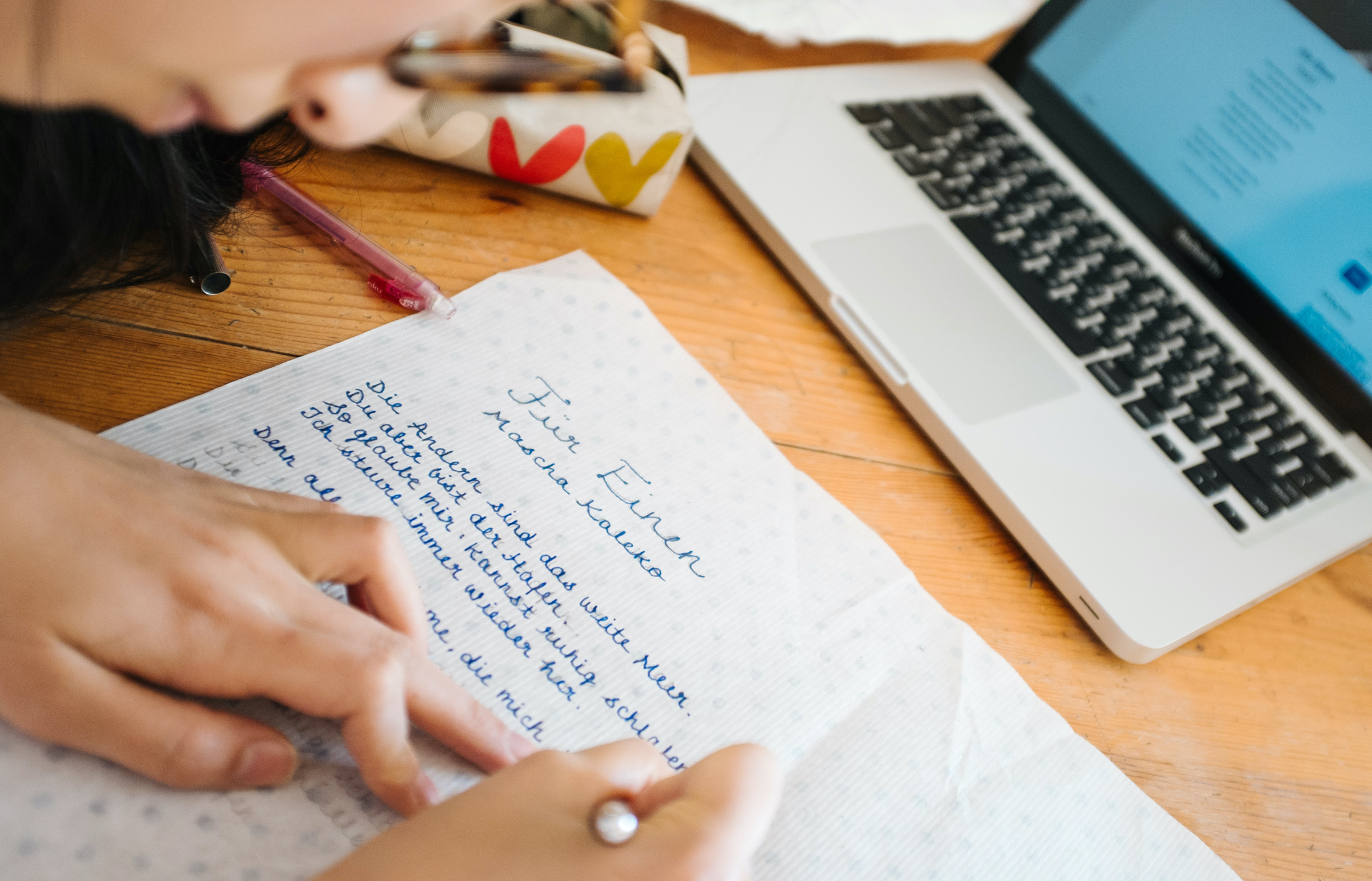This article first appeared on tamphotography.ca/blog.
As freelancers, we often have complete control over our daily schedule. And we all know that using our time productively would be awesome. We all know that watching Netflix or checking our Facebook and Instagram less would be healthy. So why do we still do it so much?
In one of my favorite books from my business school days, The Power of Habit, Pulitzer-prize winning American author Charles Duhigg talks about a simple concept that might explain why.
The Habit Loop

Thinking is hard on the brain (at least on mine). That’s what habits are for – they program cognitive tasks into our subconsciousness so that we don’t need to waste precious mental resources every time we perform them. Imagine having to consciously direct every muscle involved to brush your teeth.
The Habit loop illustrates how we form habits. First, there is a cue – in this case, a buzzing phone. Our routine is what we have trained ourselves to do every time the cue presents itself – in this case, we pick it up and open the notification screen. Finally, we get the reward – the thing we’ve been working for – in this case, a moment of distraction.
Just as our gut craves a perfectly crafted mixture of fat, salt, and sugar (hello Dorito chips), our brain can crave things. Duhigg argues that our phone habits are driven by our brain craving distraction.
Social Media companies know all this.
Sometimes I catch myself in the middle of scrolling down a news feed, and thinking, “Wait, how did I get here?”. That is not an accident. The social media platforms we know and love (sometimes a little too much) unfortunately take advantage of a cue that all of us 7.8 billion people on earth feel many times a day: uncomfortable feelings.
Are you questioning your life choices? You’re hitting an obstacle? Or simply bored? Open Instagram. It’s easy. And start scrolling.

There are two problems with this.
First, our brains are not designed for multitasking. Every time you switch tasks, there is a mental switching cost attached. In other words, every time you check Instagram while you’re working on a demanding task, you will get mentally penalized. It will take you longer to regain concentration, and you’ll tire out faster than if you had stayed focused. That’s part of the reason why sometimes we get to the end of the day and ask ourselves where all our time went, and why we got so little done. We got distracted.
Second, it can become a vicious cycle. We scroll, we like posts, we chuckle, we watch the stories. Once we’re done with all that, the work is still there waiting for us. Cue the uncomfortable feelings. A few minutes later, we’re back scrolling.
It’s a devious cycle, and according to Edward Snowden on last week’s episode of the TED Radio Hour, tech companies are taking full advantage of it so that users stay logged in and make them money. Facebook and its subsidiaries track everyone’s behavior on their platforms (the amount of time you spend looking at a post, which posts you react to, who you message the most). Then, they rent out the collected data to private companies so that they, in turn, can more effectively target us in their marketing efforts. A smart business model, one that allowed them to say until recently that their platform was “free, and always will be”.
But it’s not all bad.
On the flip side, Facebook and Instagram are incredible tools. They’ve allowed me to connect with other creatives for projects, to keep in touch, to laugh, and be inspired by original content.
So, in the end, as a creative entrepreneur, I find myself stuck between my desire to connect with peers and friends, and habits that prevent me from being productive, or simply being present in the moment. What to do?
Enter Sir Francis Bacon, who was an influential 16th-century British scientist and who also had an awesome last name. He famously said:
If money be not thy servant, it will be thy master.
Sir Francis Bacon
Another brilliant man, Christian Louis Lange, transformed this quote for his Nobel Prize Acceptance Speech. In it, he said:
Technology is a useful servant but a dangerous master
On the one hand, we know that platforms like Facebook and Instagram have mechanics built in that use our weaknesses so that we stay plugged as much as possible. On the other hand, we also know that both of these platforms can be handy tools when it comes to promoting our creative business and connecting with our peers and our audience. So how can we limit the downsides of this technology, and benefit from its advantages?
By turning our weaknesses into our strengths. In short: by changing our habits. Remember Charles Duhigg, the author of The Power of Habit, and his habit loop? Let’s see if we can use the loop of Cue – Routine – Reward to our advantage.
1) Neutralize the cue.
Whenever I need to do focused work, I make my phone disappear. I make sure it’s far enough that I need to physically move to get to it, and that I can’t see it from where I’m sitting. Most importantly, it’s on Do Not Disturb, so there are no buzzes or dings. No notifications, no checking. Simple and works most of the time.
However, sometimes I want to check my phone even without it buzzing. Sometimes I want to get away from something uncomfortable I’m feeling, be it boredom, anxiousness, or stress. For these cases, I found that the following helps.
2) Find more fulfilling routines.
Uncomfortable feelings are a part of us. They help us grow if we learn to listen to them, accept them, embrace them, and finally let them go. If we avoid them for too long, they will come to find us, in one way or another.
There is nothing inherently wrong with scrolling and consuming. We all need to relax, see cool posts, and be entertained. However, a 2017 study found that consuming social media excessively has the potential to make us discontent, anxious and unhappy. Which, going back to the Habit loop, sends us right back to the News Feed.
So instead of opening Instagram, we can turn to different means of consumption. Reading a book. Listening to that podcast while taking a walk.
Or, sometimes we get anxious when we’ve consumed way more than we’ve produced. The best way to get our consumption/production ratio back on track is by producing something. It can be anything, really. Practicing a piece of music. Cooking a delicious meal. Practicing your hand lettering. Anything. It doesn’t need to be perfect, and it doesn’t need to be for anyone but yourself. Forget the followers, and forget the praise. Create for the sake of creating. Create to feel fulfilled.
In the long term, replacing the endless scrolling with activities we find joy in will hone our skills, improve our concentration, make us more confident, and build our character. It will transform us, and the way we see the world.

Making peace
One might say that all of these tech companies are pure evil and exploiting our weaknesses just for the sake of profit. However, I think that a healthier way to look at the situation is to accept that Facebook and its subsidiaries are a substantial part of many freelancers’ life nowadays. It is a tremendous tool that can accompany our creative path by entertaining us, inspiring us, and connecting us. Yes, there will be days when life is overwhelming. We will lose focus and scroll through an endless feed for hours. That’s okay. The important thing is to build healthy habits and routines so we can come back the next day to our place of work, and continue what all of us creatives were born to do: to create.


